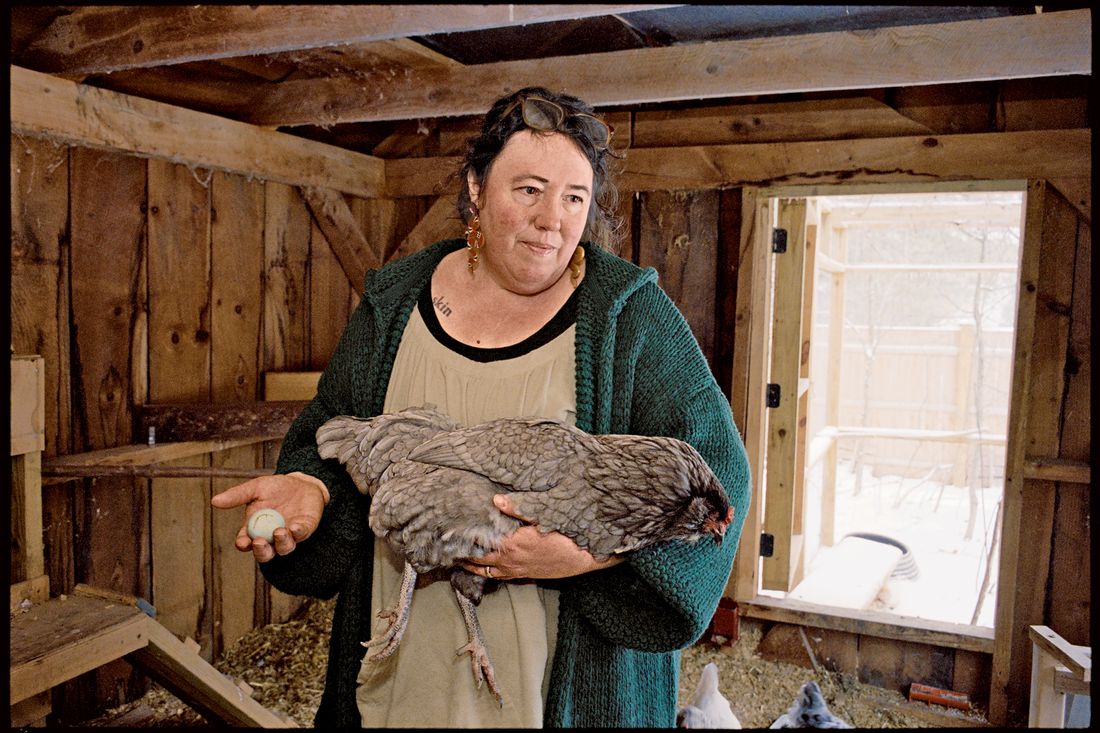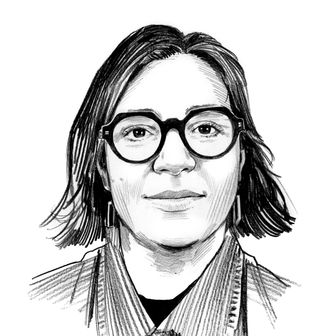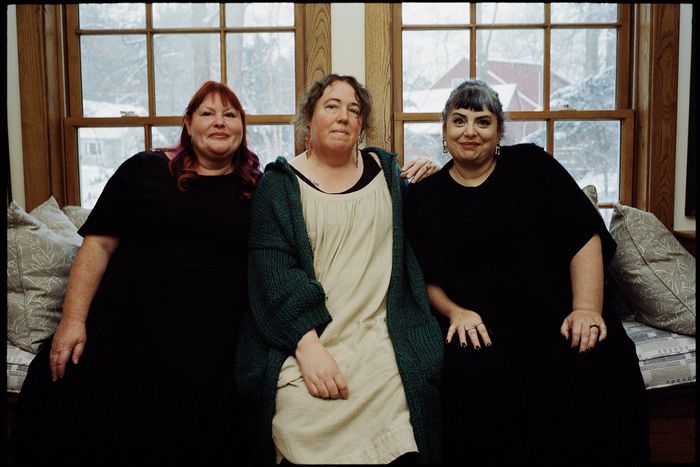
Kelly Link lives in a yellow farmhouse in Northampton with her husband, the editor Gavin J. Grant, and their 14-year-old daughter, Ursula. They have a Labradoodle named Koko and, out back, six chickens named after dragons and fonts: Toothless, Falkor, Fafnir, Midgard Serpent, Bembo, and Chancery. When I arrived on a snowy night in January, she offered me wool slippers and tea. “I’m an absolute hobbit,” she said — a creature fond of a warm hearth and a quiet evening at home. We settled at the kitchen table beside a potted sweet-potato vine that had sprouted in the pantry. “I didn’t have the heart to …” She petted the leaves. “It was so determined.”
In the stories of Kelly Link, strange things happen in otherwise ordinary settings. A teenage girl from Iowa travels to New York to find an older guy she met online and ends up at a hotel hosting a pair of conventions: one for dentists and one for superheroes. A girl from the Boston area discovers a lost world preserved inside her grandmother’s old handbag (which is made from the skin of a dog that lives inside it). Her stories do not abide by the rules of conflict and resolution — they make sense in the way that dreams make sense. Pressed to explain these phenomena, Link’s characters tend to change the subject. “The mechanics of how I can speak are really of no great interest, and I’m afraid I don’t really understand it myself, in any case,” a talking cat insists in a story from Link’s new collection, White Cat, Black Dog. Since 2001, Link has published four books of short stories, with the fifth — a series of unsettling retellings of classic fairy tales — out this month. For much of that time, she has worked in relative obscurity. Early reviewers were impressed by her originality, but she remained largely unknown outside of M.F.A. programs and fantasy circles. When her first book was published more than 20 years ago, serious literature, for the most part, meant one-pound tomes of psychological realism.
That has changed as Link’s stature has grown. In 2016, she was a finalist for the Pulitzer Prize; a few years later, the MacArthur Foundation awarded her a “genius” grant for “pushing the boundaries of literary fiction.” This shift owes something to the influence Link, 53, has had on a generation of younger, mostly women writers, including Helen Oyeyemi and Karen Russell. Like Link, they draw on old storytelling forms, including fairy tales and Greek myths. The author Carmen Maria Machado, who has a line of Link’s tattooed on her bicep (“She didn’t look back, but stepped off the edge of the known world”), said when she first encountered Link’s fiction more than a decade ago at the Iowa Writers’ Workshop, it expanded her notion of what a story could be. “I feel like she put her fingers in my eyeballs and gave me powers,” Machado said.
Most working days, Link meets up with two of her closest friends, the fantasy novelists Cassandra Clare and Holly Black, in an Amherst barn that Clare had converted into a studio. The three work there together, surrounded by steampunk-themed decorations and appliances: a wooden “assassin’s hand” equipped with needles designed to inject poison into the intended victim, a microwave encased in the shell of an old-fashioned camping oven. The trio became friends after they started running into one another at fantasy conventions two decades ago, and all ended up living within ten miles of one another in the woods of Western Massachusetts. From a certain perspective, they are unlikely workshop partners: Black and Clare write hugely popular commercial novels, mostly for young adults (they have each written more than 20 books, including five together). But they share Link’s interest in the esoteric and the uncanny. Over the afternoon, their conversation ranged from the laudanum-soaked writers’ retreat where Mary Shelley wrote Frankenstein to the CW series The Vampire Diaries. Eventually, they turned to the challenges of revision. Black, whose curtains of blue-black hair conceal ears surgically altered to make her look like an elf, said improving her drafts usually came down to plugging up the plot holes. Simple. She turned to Link. “There’s stuff about your process we will never truly understand,” she said. Link, soft-spoken and unassuming, protested that she wasn’t so unusual. “I think that’s true in general about the revision process,” she replied. She was cocooned in a green sweater, little moons and cat skulls dangling from her ears. “The reasons are sometimes very opaque but satisfying to the person who makes them.”
Link herself is a bit opaque, too. She said she doesn’t enjoy writing and only does it because she finds it “interesting.” “She has an internal compass that steers her infallibly toward strangeness,” said the writer and artist Shelley Jackson, Link’s former roommate. “It’s true of her writing as well: There’s always something held in reserve, some core that remains inexplicable.” She told a revealing anecdote. Starting in 2003, Jackson wrote a story on the bodies of 2,095 volunteers. She arranged for each volunteer to get one word from the story tattooed onto their skin. Only those who bore the ink were allowed to read the full version. Link got a word (SKIN) on her clavicle, but she’s never wanted to read the story. “It always seemed fabulous to me to be a word without any sense of the greater context,” Link told me.
When Link was growing up, her father was a minister, before eventually leaving the church to become a psychologist. He performed a series of personality tests on her and her siblings. He refused to share the results with them. “If I told you,” she remembered him saying, “it would define how you think of yourself.” “I thought, You’re right, it would be better not to know.” (She went to therapy once and “decided it was not going to work.”) The family moved around a lot but settled in Miami for a few years when Link was 9 (her parents split up soon after). One winter, there was a frost. “When that happens, they will give warnings because iguanas will become too cold and start falling out of trees,” she said. Driving home one day, they saw a lizard on the side of the road and took it home. “It lived on our patio for a few months,” she said. Sometimes Link would wear a pet boa constrictor to school like a belt. “There was not a lot of definition between the inside and the outside world,” she said.
In 1987, Link enrolled at Columbia to study creative writing. One of her professors showed a few chapters of a novel she’d started writing to his agent and editor. “It was about a woman whose son has dug an enormous hole in the backyard,” Link said. They asked if she wanted to finish it, but she’d recently won a six-month trip around the world after entering a trivia sweepstakes held by a travel agency. The tiebreaker was the question “Why do you want to go around the world?” Her answer: “Because you can’t go through it.” The trip seemed more pressing than the book, and by the time she got back, she realized she didn’t care to write a novel anyway. “The novel hardens as you go on,” she said. “At a certain point the ambitions, even the shape, begin to feel inevitable. The short story stays fluid.”
After getting an M.F.A. at the University of North Carolina at Greensboro, Link enrolled in the Clarion Science Fiction and Fantasy Writers’ Workshop. “I thought, This will be a group of people who are doing the same kind of work. But in fact, the feedback I got from many of the people was, Well, I don’t know what this is.” While she and her fellow students admired some of the same authors — Heinlein, Asimov, Tolkien — Link’s indifference to genre conventions was apparent. If her heroines start an epic quest, they’re likely to get distracted or lost or turn into someone else entirely. “I remember thinking she already wrote better than I did and there was really no point in her coming to this workshop,” said Karen Joy Fowler, one of Link’s professors at Clarion.
Over the years, as she tried to sell a collection, editors at big houses told her they liked her writing but wondered if she had a novel in a drawer they might read instead. She decided to team up with her husband, Grant, a gregarious Scot she’d met while they were both working at a used bookstore in Boston, to start a publishing business of their own, Small Beer Press. They put out her first collection, Stranger Things Happen, themselves. “We figured if I had a collection that was not selling, there were probably other writers who had collections we might be interested in publishing,” she said. They started a zine, Lady Churchill’s Rosebud Wristlet, which, along with the press, they see as a home for what Link describes as “fiction, slightly weird,” often by unpublished authors. They also publish what she calls “sideways work by established writers” — luminaries like Ursula K. Le Guin and Joan Aiken and Ted Chiang. Fowler, now the president of the Clarion Foundation (and a Small Beer author), sees Link and Grant’s influence in the admissions packets she reviews. “I’ve heard others refer to it as the Small Beer aesthetic,” she told me.
After Link won the MacArthur award, she and Grant bought a bookstore in town, partly because Link enjoys talking about books more than writing them. The store, Book Moon, has a robust selection of contemporary fiction, fantasy and science fiction, a display of titles from Small Beer Press, a cozy kids’ corner, and a table of books on mushrooms. When Link and I stopped by one day, a guy who looked like a Game of Thrones extra, with a long, knotted, grey beard and a belted black kilt, said he was in the book business himself. A rare book dealer, he specialized in “challenging material of any flavor: the occult, fetishism, hate speech.” “Basically, the more uncomfortable it is to have in your hands, the more likely I am to be like, yeah, we can probably find a home for that,” he said. “Oh wow,” Link replied.
Over the pandemic, Link finally wrote a novel. Due next year from Random House, it’s a coming-of-age story about three teenagers who come back from the dead a year after they have disappeared and have to figure out what happened to them. Watching Clare and Black at work over the years piqued her interest in the form. “I began thinking I’d like to tackle some of those same problems,” she said. Those problems have at times overwhelmed her. “I felt like I was wading through a swamp.”
Link wrote her new collection while taking short breaks from that project. She noted that these stories reveal a change in her sensibility. “The previous collection was very much about bad behavior,” she said. “In part because these stories follow a fairy tale pattern, they’re about people who are trying to do the right thing.” Even so, they are as eerie as any of her earlier tales, marked by her characteristic elusiveness. In one of them, a post-apocalyptic retelling of the “Musicians of Bremen,” set outside the ruins of Chattanooga, the narrator refuses to explain just how the world has changed, or who he was before it did. That is a “small story, so small I could fit it into a box that would fit into another box, that box still small enough to carry inside the smallest pocket,” he says at the beginning of the tale. “Were I to take it out of its box, I do not know that I could ever fit it back inside again.”
For dinner at the farmhouse that night, Link cooked ramen with roast mushrooms, tofu, and eggs from Toothless and Chancery. Her daughter, Ursula, whose drawings have appeared alongside Link’s writing in chapbooks published by Small Beer, told me she was working on a story about a world where birds and lizards have evolved in troubling ways. “They’re fighting over resources,” she said. “They are also interrupted by a group of frogs possessed by an alien symbiote, which should not have evolved that way.” She admitted the draft was getting messy. “I’m going to have to rewrite it,” she said.
“That’s what happens,” Link replied.



